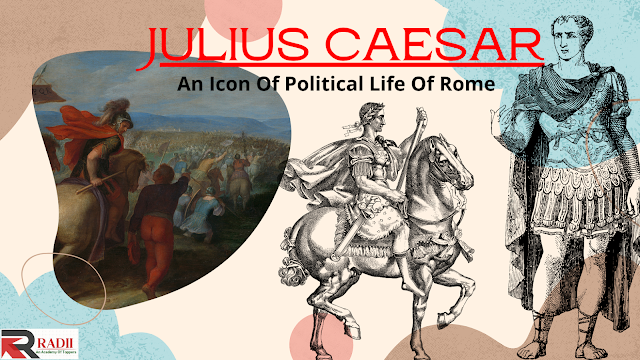Character Sketch Of Julius Caesar
The presented character Julius Caesar has played a significant role in the historical play Julius Caesar written by William Shakespeare. Julius Caesar has been introduced as an icon of the political life of Rome.
He had expanded the empire of Rome. William Shakespeare has introduced his character in the following ways: -
Political Icon
Julius Caesar expanded the empire of Rome and brought war booties to it. It was his formidable conquer. He defeated the sons of Pompeii and dominated the political life of Romans.
Courageous and brave
Julius Caesar had won many wars. In the play, he dismissed the fear of Calpurnia as foolish imagination. Undoubtedly he rejected her dream as a soothsayer’s warning and showed complete disregard to bad omens.
Popular and ambitious
William Shakespeare had made it clear that Julius Caesar was immensely popular among the people of Rome. He was adored and worshiped by them. It was because he was kind and large-hearted. He thought of the welfare of the common people. Julius Caesar was undoubtedly ambitious because he always wanted to be more and more powerful. To fulfill his burning desire he carried out military campaigns.
Rigid and inaccessible
He was firm and rigid. Once he took any decision he remained to stick to it. Once Julius Caesar had rejected the petition of the climber and rejected it again. He had pride in his inaccessibility. He could not be moved by couching and lowly courtesies.
Weakness
In spite of several qualities, Julius Caesar had been suffering from epilepsy. He was superstitious, boastful, haughty, and arrogant as well. He was always susceptible to flattery. It was proved because he became ready to go forth to meet after Decius's request in spite of his promise to Calpurnia to stay at home.
Most Important Questions
Q1. How does Cassius succeed in winning over Brutus to the side of the conspirators?
OR
What methods does Cassius employ to Brutus to his side against Julius Caesar?Ans – In the play “Julius Caesar” written by William Shakespeare, Cassius has been introduced as a conspirator, who is jealous of the great power and popularity of Julius Caesar. He dislikes him for personal reasons, so he organizes against Caesar. In his conspiracy, he employs the following method to win over Brutus to the side of the conspirators: -
Systematic approach
Cassius knows that Brutus is a noble and honorable person of the society who is held in high esteem by the people. People trust in him so he makes a systematic approach to win over him for his conspiracy.
Cassius complains that of late Brutus has not shown him the same love as he had shown in the past. In its reply, Brutus assures him that he has been at war with himself. Resultantly he has forgotten to express love to other men.
Cassius complains that of late Brutus has not shown him the same love as he had shown in the past. In its reply, Brutus assures him that he has been at war with himself. Resultantly he has forgotten to express love to other men.
Personal vanity and flattery
Cassius exploits Brutus' popularity, patriotism, and uprightness. Later Cassius proceeds to flatter Brutus. He feels sorry that he has no mirror to show his worth. He would be his mirror make him see his own worth. At last, Cassius says that he is not a common flatterer.
Trapped in conspiracy
The Romans, who respect Brutus for his moral principles and values, love him. They do so because Brutus is selfish and patriotic. They know the fact that he can never do wrong things. It is the image of Brutus that Cassius exploits fully to involve him or rather lead the conspiracy against Caesar. Brutus falls into the trap of Cassius very easily. Brutus assures Cassius that he would do anything for the sake of his country. After the assurance now he openly challenges and speaks ill of Julius Caesar.
Sense of patriotism
Cassius appeals to the family pride of Brutus and says that he is as great as Caesar. He also appeals to V’s sense of patriotism. He sees no difference between the names and sounds of Brutus and Caesar. At last, Cassius remarked that he cannot understand why Brutus should remain indifferent. He too does not understand the fact why he let tyranny flourish in Rome.
Appeal of citizen
At the last step, Cassius forges and said that several citizens of Rome had sent him letters remarking about the ambition of Julius Caesar. He adds that Roman citizens have requested Brutus to rise and free Rome from the tyranny of Caesar. In this way by flattery, appeal to patriotism, and republican spirit of his ancestors, Cassius is succeeded to win over Brutus to his side against Julius Caesar.
Q2. Julius Caesar's death is more powerful than Caesar's alive. Discuss with reference to the play Julius Caesar by William Shakespeare.
Ans- Julius Caesar, the hero of the play written by William Shakespeare is quite different in character from Caesar of history. According to the description in history, the real Caesar was a genius and shrewd man of action. In the play, Shakespeare has proved the fact that Caesar dead is more powerful than Caesar alive in the following ways: -
Introduction
William Shakespeare describes very little of Julius Caesar’s greatness in the play. He introduces him as proud, arrogant, and boastful. Cassius complains of Caesar’s “Becoming a god” and “a colossus bestriding the narrow world”.
Casca, one of the conspirators, tells Brutus that Julius Caesar refused to crown at the feast of Lupercalia because he feared public disapproval, otherwise he was willing to be crowned. Decius remarks that Julius Caesar is fond of flattery. In this way, the hero is introduced negatively while he is alive.
Proud and ambitious
Caesar is a glorious beggar. He is the great general of the Roman army who won many battles; he has been described as being the one man in Rome. He gets the love and respect of the Roman citizen. His great position, the flattery with which he looked upon, and the political as well as the military success that he has won, make him regarded as a god. It shows that he is boastful arrogant because he regards himself as “more dangerous than danger itself” and “as fixed as the northern star” in fact he has to struggle between pride and fear.
Assassination of Caesar
Brutus, Cassius, and other conspirators kill the hero. They try to disgrace Caesar. They remark that Caesar was too much ambitious and would become a tyrant. He would deny the people their legitimate liberties. The conspirators succeed in swaying the masses against him after his murder. The fact reveals that in spite of Caesar’s greatness, he is not in the heart of the Roman citizen. As they acclaim the conspirators as champions and heroes. It shows Julius Caesar was not so powerful when he was alive.
Re-honor of the benevolent king
Marks Antony, the friend of Julius Caesar begins the process of revenge. With the help of his speech, he regains the favor of the Roman people. Within a few days, the conspirators are destabilized and demolished. Resultantly the people re-honored the dead king.
A powerful symbol
The dead Julius Caesar is a powerful symbol while the living Caesar had only stood for himself, whose ambition was the crown, but he failed to get it.
Julius Caesar becomes a symbol of the force of a principle after his death. The force of imperialism rallied around his memory. His name unites the masses against the conspirator. The conspirators are made to realize before their death that they have done a crime by murdering the benevolent king.

Julius Caesar becomes a symbol of the force of a principle after his death. The force of imperialism rallied around his memory. His name unites the masses against the conspirator. The conspirators are made to realize before their death that they have done a crime by murdering the benevolent king.
















Madam Rekha, I really appreciate your style of writing a blog. Bye the way, do you write about education articles and stories?
ReplyDelete